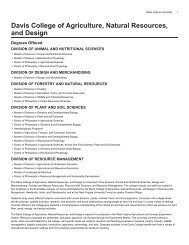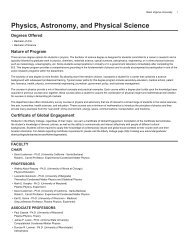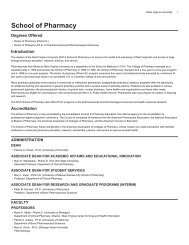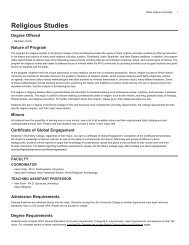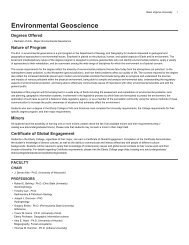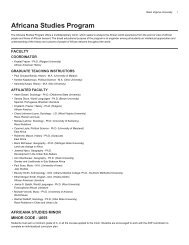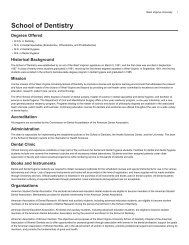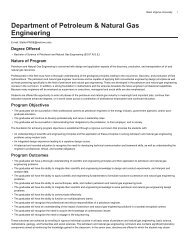Download PDF of this page - West Virginia University
Download PDF of this page - West Virginia University
Download PDF of this page - West Virginia University
You also want an ePaper? Increase the reach of your titles
YUMPU automatically turns print PDFs into web optimized ePapers that Google loves.
<strong>West</strong> <strong>Virginia</strong> <strong>University</strong> 1<br />
Pharmaceutical and Pharmacological Sciences<br />
Introduction<br />
The WVU School <strong>of</strong> Pharmacy <strong>of</strong>fers graduate programs in the pharmaceutical and pharmacological sciences for the Ph.D. degree. The school is<br />
advantageously located in the Health Sciences Center complex which also houses all departments <strong>of</strong> the Schools <strong>of</strong> Medicine, Nursing, and Dentistry,<br />
as well as a comprehensive medical library, audio-visual and computer-based learning center, research core facilities, and laboratory animal quarters.<br />
State-<strong>of</strong>-the-art research laboratories are located throughout the Health Sciences Center complex to facilitate interactions with the Mary Babb Randolph<br />
Cancer Center, Center for Neuroscience, and Center for Cardiovascular and Respiratory Sciences. In addition, the Health Sciences Center has easy<br />
access to the Evansdale and Downtown campuses <strong>of</strong> WVU through a personal rapid transit (PRT) system. The scientific community, which is especially<br />
well-developed, draws on area scientists throughout WVU, the Centers <strong>of</strong> Disease Control/National Institute on Occupational Safety and Health (CDC/<br />
NIOSH), Federal Bureau <strong>of</strong> Investigation (FBI), and a variety <strong>of</strong> research centers supported by the National Institutes <strong>of</strong> Health (NIH), National Science<br />
Foundation (NSF), and the Department <strong>of</strong> Energy (DOE). A CDC/NIOSH research facility is two blocks away, and Mylan Pharmaceuticals, a leading<br />
generic drug producer in the world, is located across the street from the Health Sciences Center. In addition, the school has long-standing collaborations<br />
with several state agencies and multinational pharmaceutical companies.<br />
Degrees Offered<br />
• Doctor <strong>of</strong> Philosophy (Ph.D. in Pharmaceutical and Pharmacological Sciences)<br />
Research interests are complementary to the focus <strong>of</strong> each <strong>of</strong> the two pathways in the program: pharmaceutical and pharmacological sciences, and<br />
health outcomes. Key areas <strong>of</strong> research interest and expertise in the pharmaceutical and pharmacological sciences pathway include: pharmaceutical<br />
sciences, pharmacology, cancer, neuroscience, nanoscience, and toxicology. Key areas <strong>of</strong> research interest and expertise in the health outcomes<br />
pathway include: health outcomes, health disparities, health services, health quality, pharmacoeconomics, pharmacoepidemiology, patient reported<br />
outcomes, and health behavior.<br />
Graduate Program Pharmaceutical and Pharmacological Science<br />
The School <strong>of</strong> Pharmacy <strong>of</strong>fers a doctor <strong>of</strong> philosophy (Ph.D.) degree in pharmaceutical and pharmacological sciences with two pathways aimed at<br />
training competent researchers and educators: health outcomes research, and pharmaceutical and pharmacological sciences. Both pathways in the<br />
graduate program provide interdisciplinary, research-oriented curricula designed to develop the interests, capabilities, and potential <strong>of</strong> the individual<br />
student.<br />
Academic Standards<br />
No credits are acceptable toward a graduate degree with a grade lower than a C. A graduate student is expected to have a cumulative grade point<br />
average <strong>of</strong> at least 3.0 in all graduate courses to continue in the program and to qualify for a Ph.D. degree.<br />
Admission Requirements<br />
Applicants for admission into the graduate program must satisfy the WVU and Health Sciences Center general requirements for admission as a<br />
graduate student. The applicant must possess a baccalaureate degree, background in a suitable area <strong>of</strong> study, an overall grade point average <strong>of</strong> at<br />
least 3.0, and the aptitude and interest for graduate work in pharmaceutical and pharmacological sciences or health outcomes research to be admitted.<br />
Graduate Record Examination (GRE) scores in the verbal, quantitative, and analytic essay portions are required from all students planning on entering<br />
the graduate program. TOEFL scores are required <strong>of</strong> international students from countries where English is not the primary language.<br />
To obtain specific information related to the school’s graduate programs, graduate faculty research interests, and availability <strong>of</strong> graduate assistantships<br />
or fellowships, applicants may contact:<br />
Office <strong>of</strong> Research and Graduate Programs<br />
WVU School <strong>of</strong> Pharmacy<br />
2036 Health Sciences Center North<br />
P.O. Box 9500 Morgantown, WV 26506<br />
Telephone: (304) 293-1480<br />
e-mail: pgannett@hsc.wvu.edu<br />
Doctor <strong>of</strong> Philosophy (Ph.D.)<br />
The School <strong>of</strong> Pharmacy <strong>of</strong>fers programs <strong>of</strong> study leading to the doctor <strong>of</strong> philosophy (Ph.D.) degree in the pharmaceutical and pharmacological<br />
sciences via two pathways: health outcomes research, and pharmaceutical and pharmacological sciences. Specialty areas <strong>of</strong> study include:<br />
pharmacology, drug metabolism, cancer cell biology, nanotechnology, health outcomes, epidemiology, and policy research.
2 Pharmaceutical and Pharmacological Sciences<br />
Coursework and the suggested plan <strong>of</strong> study specific to each pathway are listed below.<br />
For each pathway in the graduate program, upon completion <strong>of</strong> the second year <strong>of</strong> study, students must submit a formal plan <strong>of</strong> study and a research<br />
plan that is approved by their Ph.D. committee. Progress is expected to continue with guidance from the student’s research committee. Final admission<br />
to candidacy requires satisfactory performance on written and oral qualifying examinations as well as a dissertation proposal defense. Subsequent to<br />
admission to candidacy, a substantial part <strong>of</strong> the program is devoted to an original research project which culminates in a first-authored publication and<br />
dissertation. To be recommended for a Ph.D., the dissertation must be satisfactorily completed and defended at an oral examination.<br />
For more specific information, please contact the associate dean for research and graduate programs:<br />
Dr. Peter Gannett<br />
Associate Dean for Research and Graduate Programs (Interim)<br />
WVU School <strong>of</strong> Pharmacy<br />
2036 Health Sciences Center North<br />
P.O. Box 9500<br />
Morgantown, WV 26506-9500<br />
Telephone: (304) 293-1480<br />
email: pgannett@hsc.wvu.edu<br />
Requirements for Ph.D. Degree<br />
PHARMACEUTICAL AND PHARMACOLOGICAL SCIENCES PATHWAY<br />
Students planning on enrolling in the pharmaceutical and pharmacological sciences pathway are admitted through the health sciences center<br />
interdisciplinary graduate program in biomedical science, through which they complete the first year <strong>of</strong> study. During the first year, students take a<br />
required set <strong>of</strong> courses and rotate through the laboratories <strong>of</strong> potential research mentors. At the end <strong>of</strong> the first year, students may formally enroll in the<br />
pharmaceutical and pharmacological sciences graduate program and select a research advisor.<br />
Curriculum Requirements<br />
BMS 700 Scientific Integrity 1<br />
BMS 706 Cellular Methods 1<br />
BMS 715 Molecular Genetics 3<br />
BMS 720 Scientific Writing 2<br />
BMS 797 Research 1-5<br />
BMS Course - Fundamentals <strong>of</strong> Contemporary Biomedical Research 1-8<br />
PHAR 796 Graudate Seminar 6<br />
PHAR 797 Research 40-50<br />
PHAR 798 Thesis or Dissertation 6-12<br />
Advanced Courses/Elective Modules 14-21<br />
Journal Clubs (Select from the following) 6<br />
PHAR 783<br />
PHAR 784<br />
PHAR 787<br />
Pharm Cell Biology Seminar<br />
Pharmacology Journal Club<br />
Drug Discovery & Development<br />
Laboratory Rotations 1 1-3<br />
Laboratory Rotations 2 1<br />
Laboratory Rotations 3 1<br />
Qualifying Exams<br />
Proposal Defense<br />
Total Hours 84-120<br />
Advanced courses/Electives Modules<br />
BIOC 791 Advanced Topics 1-6<br />
CHEM 335 Method:Structure Determination 4<br />
CHEM 346 Physical Chemistry 3<br />
CHEM 514 Mass Spec Principles & Practic 3<br />
CHEM 531 Advanced Organic Chemistry 1 3<br />
CHEM 532 Advanced Organic Chemistry 2 3
<strong>West</strong> <strong>Virginia</strong> <strong>University</strong> 3<br />
PCOL 743 Pharmacology 1 3<br />
PCOL 744 Pharmacology 2 3<br />
PCOL 745 Advanced Pharmacology1 1-3<br />
PCOL 746 Advanced Pharmacology 2 1-3<br />
PHAR 711 Chemical Properties <strong>of</strong> Drugs 2<br />
PHAR 716 Chemistry <strong>of</strong> Drug Action 1 3<br />
PHAR 726 Chemistry <strong>of</strong> Drug Action 2 2<br />
PHAR 731 Biopharm & Pharmacokinetics 3<br />
PHAR 779 Drugs: Bench to Market 3<br />
PHAR 780 Introductio-Molecular Modeling 4<br />
PHAR 781 Drug Metabolism 3<br />
Suggested Plan <strong>of</strong> Study<br />
First Year<br />
Fall Hours Spring Hours Summer Hours<br />
BMS 700 1 BMS 715 3 BMS 720 2<br />
BMS 706 1 Laboratory Rotations 2 1 PHAR 797 2<br />
Laboratory Rotations 1 1-3 Laboratory Rotations 3 1<br />
BMS Course -<br />
Fundamentals <strong>of</strong><br />
Contemprary Biomedical<br />
Research<br />
BMS 797 1-5<br />
*Students must sign<br />
up for a minimum <strong>of</strong> 9<br />
hours<br />
Second Year<br />
1-8 Advanced Courses/<br />
Elective Modules<br />
(selected from the list)<br />
5-9<br />
5-18 10-14 4<br />
Fall Hours Spring Hours Summer Hours<br />
Advanced Courses/<br />
Elective Modules (Select<br />
from the list)<br />
3-6 Advanced Courses/<br />
Elective Modules (select<br />
from list)<br />
PHAR 796 1 PHAR 796 1<br />
Journal Club (Select<br />
from the following)<br />
1 Journal Club (Select<br />
from the following)<br />
PHAR 783 PHAR 783<br />
PHAR 784 PHAR 784<br />
PHAR 787 PHAR 787<br />
PHAR 797 4-5 PHAR 797 4-7<br />
Third Year<br />
Take Qualifying Exams<br />
3 PHAR 797 6<br />
9-13 9-12 6<br />
Fall Hours Spring Hours Summer Hours<br />
Advanced Courses/<br />
Elective Modules (Select<br />
from list)<br />
1<br />
3 PHAR 798 2-4 PHAR 797 6<br />
PHAR 796 1 PHAR 796 1<br />
Journal Club (Select<br />
from the following)<br />
1 Journal Club (Select<br />
from the following)<br />
PHAR 783 PHAR 783<br />
PHAR 784 PHAR 784<br />
PHAR 787 PHAR 787<br />
PHAR 797 3-4 PHAR 797 3<br />
1
4 Pharmaceutical and Pharmacological Sciences<br />
Proposal Defense<br />
*Students must sign<br />
up for a minimum <strong>of</strong> 9<br />
hours<br />
Fourth Year<br />
*Students must sign<br />
up for a minimum <strong>of</strong> 9<br />
hours<br />
8-9 7-9 6<br />
Fall Hours Spring Hours Summer Hours<br />
PHAR 797 3-6 PHAR 797 3-5 PHAR 797 6<br />
PHAR 798 2-4 PHAR 798 2-4<br />
PHAR 796 1 PHAR 796 1<br />
Journal Club (Select<br />
from the following)<br />
1 Journal Club (Select<br />
from the following)<br />
PHAR 783 PHAR 783<br />
PHAR 784 PHAR 784<br />
PHAR 787 PHAR 787<br />
Total credit hours: 84-120<br />
*Students must sign<br />
up for a minimum <strong>of</strong> 9<br />
hours<br />
HEALTH OUTCOMES RESEARCH PATHWAY<br />
7-12 7-11 6<br />
Students enrolling in the health outcomes pathway are admitted directly into the School <strong>of</strong> Pharmacy. To obtain specific application and admission<br />
information about the Ph.D. program pathway in health outcomes research, please visit: http://pharmacy.hsc.wvu.edu/orgp/Pathways/Health-Outcomes-<br />
Pathway.<br />
Curriculum Requirements<br />
BIOS 601 Applied Biostatistics 1 3<br />
BIOS 602 Applied Biostatistics Lab 1<br />
BIOS 603 Applied Biostatistics 2 3<br />
Select one <strong>of</strong> the following: 3<br />
BIOS 604 Applied Biostatisics 3<br />
PSYC 612<br />
Multivariate Analysis<br />
Select one <strong>of</strong> the following: 2<br />
BMS 700<br />
PHAR 758<br />
Scientific Integrity<br />
Ethcl/Rgltry Aspcts-Clin Rsrch<br />
BMS 720 Scientific Writing 2<br />
ECON 301 Intermed Micro-Economic Theory 3<br />
Select one <strong>of</strong> the following: 6<br />
PHAR 753<br />
PHAR 756<br />
Soc/Bhvrl Thry/Hlth Otcm Rsrch<br />
Health Survey Research Methods<br />
Select one <strong>of</strong> the following: 6<br />
PHAR 754<br />
PHAR 786<br />
Decision Analysis-Healthcare<br />
Health Svcs Res/Sec Databases<br />
Select one <strong>of</strong> the following: 6<br />
PHAR 755<br />
PHAR 758<br />
Pharmacoeconomics<br />
Ethcl/Rgltry Aspcts-Clin Rsrch<br />
Select one <strong>of</strong> the following: 3<br />
PHAR 756<br />
PHAR 758<br />
PUBA 670<br />
Health Survey Research Methods<br />
Ethcl/Rgltry Aspcts-Clin Rsrch<br />
Health Systems<br />
1
<strong>West</strong> <strong>Virginia</strong> <strong>University</strong> 5<br />
PHAR 769 Adv Hlth Service Rsrch Methods 3<br />
PHAR course "Intro-OR/PR Outcome" 3<br />
PHAR 797 Research 1-15<br />
PHAR 798 Dissertation 1-6<br />
SBHS 701 Public Health Grant Writing 3<br />
PHAR 788 Graduate Seminar 4<br />
Electives 3-26<br />
Total Hours 56-98<br />
Suggested Plan <strong>of</strong> Study<br />
First Year<br />
Fall Hours Spring Hours Summer Hours<br />
BIOS 601 3 BIOS 603 3 BMS 720 2<br />
BIOS 602<br />
Select one <strong>of</strong> the<br />
Following:<br />
1 Select one <strong>of</strong> the<br />
following:<br />
3 ECON 301 3<br />
3 PHAR 754 PHAR 798 1-6<br />
BMS 700 PHAR 786 PHAR 797 1-15<br />
PHAR 758 PHAR 788 1 Electives 1-12<br />
PHAR 788 1 Electives 2-6<br />
Select one <strong>of</strong> the<br />
Folowing:<br />
PHAR 753<br />
PHAR 758<br />
Select one <strong>of</strong> the<br />
following:<br />
PHAR 753<br />
PHAR 756<br />
Second Year<br />
3<br />
3<br />
14 9-13 8-38<br />
Fall Hours Spring Hours<br />
Select one <strong>of</strong> the<br />
following:<br />
3 Select one <strong>of</strong> the<br />
following:<br />
PHAR 755 BIOS 604<br />
PHAR 758 PSYC 612<br />
Select one <strong>of</strong> the<br />
following:<br />
3 PHAR course "Intro-OR/<br />
PR Outcome"<br />
PHAR 753 SBHS 701 3<br />
PHAR 756<br />
Select one <strong>of</strong> the<br />
following:<br />
Select one <strong>of</strong> the<br />
following:<br />
3 PHAR 754<br />
PUBA 670 PHAR 786<br />
PHAR 758 PHAR 788 1<br />
PHAR 756 Electives 0-2<br />
PHAR 769 3<br />
PHAR 788 1<br />
Electives 0-6<br />
Total credit hours: 57-99<br />
13-19 13-15<br />
3<br />
3<br />
3
6 Pharmaceutical and Pharmacological Sciences<br />
COURSES<br />
PHAR 691A-Z. Advanced Topics. 1-6 Hours.<br />
PR: Consent. Investigation <strong>of</strong> advanced topics not covered in regularly scheduled courses.<br />
PHAR 693A-Z. Special Topics. 1-6 Hours.<br />
A study <strong>of</strong> contemporary topics selected from recent developments in the field.<br />
PHAR 694A-Z. Seminar. 1-6 Hours.<br />
Seminars arranged for advanced graduate students. Grading may be S/U.<br />
PHAR 696. Graduate Seminar. 1 Hour.<br />
PR: Consent. Each graduate student will present at least one seminar to the assembled faculty and graduate student body <strong>of</strong> his or her program.<br />
PHAR 697. Research. 1-15 Hours.<br />
PR: Consent. Research activities leading to thesis, problem report, research paper or equivalent scholarly project, or a dissertation. (Grading may be S/<br />
U.).<br />
PHAR 700. Pharmacy as a Pr<strong>of</strong>ession. 1 Hour.<br />
PR: First pr<strong>of</strong>essional year standing or consent. Introduces students to the concept <strong>of</strong> pr<strong>of</strong>essionalism, the scope <strong>of</strong> pharmacy practice opportunities, the<br />
health care system as it relates to pharmacy, and other contemporary issues in pharmacy practice. (Grading will be S/U.).<br />
PHAR 701. Pharmaceutical Care Lab 1. 2 Hours.<br />
PR: First pr<strong>of</strong>essional year standing or consent. Students will develop skills in medical terminology, communications, information retrieval, dispensing,<br />
compounding, calculations, pharmaceutical care, and problem-solving skills.<br />
PHAR 702. Pharmaceutics 1. 3 Hours.<br />
PR: First pr<strong>of</strong>essional year standing or consent. Introduces drug physical-chemical characteristics relevant to the design and performance <strong>of</strong> delivery<br />
systems. Pharmaceutical dosage forms taught include disperse and polydisperse systems (suspensions, emulsions, creams, ointments, aerosols and<br />
transdermals).<br />
PHAR 703. Pharmacy Practice Experience 1. 1 Hour.<br />
PR: First pr<strong>of</strong>essional year standing or consent. Provides an overview <strong>of</strong> the roles and responsibilities <strong>of</strong> community pharmacists and provides<br />
experiential learning in a community pharmacy setting. First course in a six-semester sequence that introduces students to various pharmacy practice<br />
settings.<br />
PHAR 704. Introduction to Research. 1 Hour.<br />
Provides pharmacy students with a forum for the discussion <strong>of</strong> a wide variety <strong>of</strong> research activities and careers. Also provides an appreciation for the<br />
science on which the pharmacy pr<strong>of</strong>ession is based and continually evolves.<br />
PHAR 708. Pharmaceutics 2. 3 Hours.<br />
PR: PHAR 702. Continuation <strong>of</strong> PHAR 702. Solids dosage forms (tablets, capsules, sustained-release), regulatory pathways for marketing drugs, and<br />
biopharmaceutical principles (dosage form behavior in body).<br />
PHAR 709. Immunology/Biotechnology. 2 Hours.<br />
PR: First year pr<strong>of</strong>essional standing or consent. Students will learn basic functions <strong>of</strong> the immune system, elements <strong>of</strong> the pharmaceutical applications<br />
<strong>of</strong> biotechnology, and be introduced to the chemotherapy <strong>of</strong> infections.<br />
PHAR 710. Pharmacy Practice Experience 2. 1 Hour.<br />
PR:PHAR 703 or consent. Provides an overview <strong>of</strong> the roles and responsibilities <strong>of</strong> community pharmacists and provides experiential learning in a<br />
community pharmacy setting. Second course in a six-semester sequence that introduces students to various pharmacy practice settings.<br />
PHAR 711. Chemical Properties <strong>of</strong> Drugs. 2 Hours.<br />
PR: First year pr<strong>of</strong>essional standing or consent. Principles <strong>of</strong> chemical stability and chemical properties as they relate to drug molecules. Topics to be<br />
covered include functional group analysis, solubility, oil/water partitioning, organic acids and bases, and drug decomposition and metabolism.<br />
PHAR 712. Pharmaceutical Care Lab 2. 2 Hours.<br />
PR: First pr<strong>of</strong>essional year standing or consent. Continuation <strong>of</strong> PHAR 701.<br />
PHAR 714. Intro Community Rotation. 4 Hours.<br />
PR or CONC: PHAR 710. Students will gain experience preparing prescriptions, providing basic drug information to patients, and participating in disease<br />
prevention activities in a community pharmacy setting.<br />
PHAR 715. Pharmacotherapeutics 1. 4 Hours.<br />
PR: Second pr<strong>of</strong>essional year standing or consent. Principles and concepts <strong>of</strong> pathophysiology and pharmacotherapeutics. An organ system approach<br />
to disease states and their therapeutic management is followed.<br />
PHAR 716. Chemistry <strong>of</strong> Drug Action 1. 3 Hours.<br />
PR: PHAR 711 or consent. Provides a basic understanding <strong>of</strong> relationships between the chemical structure <strong>of</strong> a drug and its biological effect.<br />
Physiochemical properties, enzymatic transformations and structure-activity relationships (SAR) <strong>of</strong> important pharmaceutical agents are discussed.
<strong>West</strong> <strong>Virginia</strong> <strong>University</strong> 7<br />
PHAR 717. Pharmacy Practice Experience 3. 1 Hour.<br />
PR: Second pr<strong>of</strong>essional year standing or consent. Introduces students to the principles <strong>of</strong> service learning through development <strong>of</strong> an on-site<br />
healthcare-related service project. Third course <strong>of</strong> a six-semester sequence that introduces students to various pharmacy practice settings.<br />
PHAR 718. Pediatric Pharmacotherapy. 2 Hours.<br />
PR: Second pr<strong>of</strong>essional year standing or consent. Overview <strong>of</strong> common pathophysiology and pharmacotherapy principles in the pediatric population<br />
and selection <strong>of</strong> drug therapy to treat the pediatric patient.<br />
PHAR 719. Pharmacy Practice Experience 4. 1 Hour.<br />
PR: PHAR 717 or consent. Introduces students to the principles <strong>of</strong> service learning through implementation <strong>of</strong> an on-site healthcare related service<br />
project. Fourth course <strong>of</strong> a six-semester sequence that introduces students to various pharmacy practice settings.<br />
PHAR 720. Patient Health Education. 2 Hours.<br />
PR: Second pr<strong>of</strong>essional year standing or consent. Interpersonal communication skills will be enhanced in the areas <strong>of</strong> patient-centered and colleaguecentered<br />
communications. Students will learn processes for providing pharmaceutical care (e.g., interviewing and counseling patients; formulating a<br />
plan; monitoring; and documenting information).<br />
PHAR 721. Advocacy and Leadership. 2 Hours.<br />
PR: Second and third pr<strong>of</strong>essional year standing or consent. The course will focus on developing the student’s leadership skills as an advocate for the<br />
pr<strong>of</strong>ession <strong>of</strong> pharmacy.<br />
PHAR 722. WMD and Disaster Planning. 1 Hour.<br />
Through didactic, hands on instruction, and participation in real world disaster planning sessions and/or drills, students learn about weapons <strong>of</strong> mass<br />
destruct (WMD) surveillance and mitigation in addition to disaster planning principles.<br />
PHAR 723. Pharmaceutical Care Lab 3. 1 Hour.<br />
PR: Second pr<strong>of</strong>essional year standing or consent. Continuation <strong>of</strong> PHAR 712.<br />
PHAR 724. Pharmaceutical Care Lab 4. 2 Hours.<br />
PR: Second pr<strong>of</strong>essional year standing or consent. Continuation <strong>of</strong> PHAR 723.<br />
PHAR 725. Pharmacotherapeutics 2. 4 Hours.<br />
PR: PHAR 715 or consent. A continuation <strong>of</strong> PHAR 715.<br />
PHAR 726. Chemistry <strong>of</strong> Drug Action 2. 2 Hours.<br />
PR: PHAR 716 or consent. A continuation <strong>of</strong> PHAR 716.<br />
PHAR 727. Medical Literature Evaluation. 2 Hours.<br />
PR: Second pr<strong>of</strong>essional year standing or consent. Emphasis is placed on the critical analysis and evaluation <strong>of</strong> the primary literature. Seconday and<br />
computerized information resources are also discussed, including other selected aspects <strong>of</strong> drug information.<br />
PHAR 728. Pharmacy Management. 2 Hours.<br />
PR: Second pr<strong>of</strong>essional year standing or consent. This course provides an introductory survey <strong>of</strong> the basic principles <strong>of</strong> personnel and fiscal<br />
management as they apply to organizational planning and decision-making, organizational design and structure, leadership and control in organizations,<br />
and the issues facing pharmacy managers.<br />
PHAR 729. Intro Institutional Rotation. 2 Hours.<br />
PR or Conc: (PHAR 719 and PHAR 724) or consent. Gain experience in an institutional pharmacy setting.<br />
PHAR 730. Pharmacotherapeutics 3. 4 Hours.<br />
PR: PHAR 725 or consent. A continuation <strong>of</strong> PHAR 725.<br />
PHAR 731. Biopharm & Pharmacokinetics. 3 Hours.<br />
PR: Third year pr<strong>of</strong>essional standing or consent. Fundamental principles <strong>of</strong> biopharmaceutics (physicochemical and biological processes affecting drug<br />
transit into the systemic circulation) and pharmacokinetics (kinetic and biological processes a drug undergoes upon entering the body).<br />
PHAR 732. Non-Prescription Drugs. 3 Hours.<br />
PR: Third year pr<strong>of</strong>essional standing or consent. An advanced level course on the appropriate selection, and use <strong>of</strong> non-prescription drug products in<br />
the contemporary practice setting, the basis for self-medication, assessment <strong>of</strong> patient condition, and approach to patient counseling.<br />
PHAR 733. Pharmacy Systems. 2 Hours.<br />
PR: Third year pr<strong>of</strong>essioal standing or consent. Basic principles <strong>of</strong> financial management as they apply to the day-to-day operatoins in pharmacy<br />
systems present in institutional, community, long-term care facilities and other pharmacy venues.<br />
PHAR 734. Pharmacy Law and Ethics. 3 Hours.<br />
PR: First pr<strong>of</strong>essional year standing or consent. The legal and ethical basis <strong>of</strong> pharmacy practice. Students learn about federal and state statutes, rules,<br />
and regulations that affect pharmacy practice. Ethics related situations that can arise during pharmacy practice will also be discussed.<br />
PHAR 735. Pharmaceutical Care Lab 5. 1 Hour.<br />
PR: PHAR 724. Continuation <strong>of</strong> PHAR 724.
8 Pharmaceutical and Pharmacological Sciences<br />
PHAR 736. Pharmaceutical Care Lab 6. 1 Hour.<br />
PR: Third Year Pr<strong>of</strong>essional standing or consent. Experience in pharmaceutical compounding, patient assessment and monitoring, pr<strong>of</strong>essional/ethical<br />
decision making, pharmacokinetic dosing <strong>of</strong> medications, and prevention <strong>of</strong> adverse drug-related events and medication errors.<br />
PHAR 737. Disease Prevent Health Promo. 2 Hours.<br />
PR: Third year pr<strong>of</strong>essional standing or consent. This course exposes pharmacy students to pharmacoepidemiology and public health. Instruction<br />
focuses on pharmacists as integral to preventing and detecting disease and promoting community health. Emphasis is given to rural health care and<br />
Appalachian culture.<br />
PHAR 738. Outcomes Asesmnt/Quality Imprv. 2 Hours.<br />
PR: Third pr<strong>of</strong>essional year standing or consent. Outcomes assessment and quality improvement will expose students to the development and<br />
implementation <strong>of</strong> formularies, drug use evaluations, outcomes assessment, and quality improvement. Emphasis will be placed on how these issues<br />
relate to pharmaceutical services.<br />
PHAR 739. Therapeutic Patient Monitoring. 3 Hours.<br />
PR: Third pr<strong>of</strong>essional year standing or consent. Employs both didactic and experiential instruction to provide students with the knowledge and skills<br />
required to assess the health status <strong>of</strong> medicated patients with special emphasis on monitoring therapeutic endpoints.<br />
PHAR 740. Pharmacotherapeutics 4. 4 Hours.<br />
PR: PHAR 730 or consent. A continuation <strong>of</strong> PHAR 730.<br />
PHAR 741. Clinical Pharmacokinetics. 3 Hours.<br />
PR: PHAR 731 or consent. This course will review advanced concepts in pharmacokinetics and cover the basic pharmacokinetic properties <strong>of</strong> commonly<br />
used drugs and apply these principles to drug dosing, patient management, and rational therapeutic drug monitoring.<br />
PHAR 742. Pharmacy Practice Experience 5. 1 Hour.<br />
PR: Third pr<strong>of</strong>essional year standing or consent. Provides experiential learning in an acute or ambulatory care pharmacy practice setting. Fifth course in<br />
a six-semester sequence that introduces students to various pharmacy practice settings.<br />
PHAR 743. Teach to Learn: Learn to Teach. 3 Hours.<br />
Provides pharmacy students the opportunity to learn how to teach in higher education/pharmacy and develop their teaching skills by participating in<br />
select teaching and learning activities.<br />
PHAR 745. Critical Care Pharmacotherapy. 2 Hours.<br />
PR: Third pr<strong>of</strong>essional year standing or consent. Gain knowledge in multiple facets <strong>of</strong> critical care pharmacotherapy, particularly for students interested<br />
in pharmacy residency training in a clinical setting.<br />
PHAR 746. Pharmacy Practice Experience 6. 1 Hour.<br />
PR: PHAR 742 or consent. Provides experiential learning in an acute or ambulatory care pharmacy practice setting. Sixth course in a six-semester<br />
sequence that introduces students to various pharmacy practice settings.<br />
PHAR 747. History Of Pharmacy. 2 Hours.<br />
Gives the student a deeper appreciation <strong>of</strong> the background <strong>of</strong> pharmacy and its development from ancient times to present.<br />
PHAR 748. Acute Care Case Studies. 2 Hours.<br />
PR: Third pr<strong>of</strong>essional year standing or consent. Gain experience developing pharmaceutical care plans in an acute care setting. Further prepares<br />
students interested in pursuing pharmacy residency training.<br />
PHAR 749. Pharmaceutical Investigation. 2-3 Hours.<br />
PR: Consent. Original investigation in pharmaceutics, medicinal chemistry, pharmacology, pharmaceutical systems and policy, or clinical pharmacy.<br />
(Grading may be P/F.).<br />
PHAR 749A. Pharmaceutical Investigation. 2-3 Hours.<br />
PR: Consent. Original investigation in pharmaceutics, medicinal chemistry, pharmacology, pharmaceutical systems and policy, or clinical pharmacy.<br />
(Grading may be P/F.).<br />
PHAR 749B. Pharmaceutical Investigation. 2-3 Hours.<br />
PR: Consent. Original investigation in pharmaceutics, medicinal chemistry, pharmacology, pharmacceutical systems and policy or clinical pharmacy.<br />
(Grading may be P/F.).<br />
PHAR 749C. Pharmaceutical Investigation. 2-3 Hours.<br />
PR: Consent. Original investigation in pharmaceutics, medicinal chemistry, pharmacology, pharmaceutical systems and policy or clinical pharmacy.<br />
(Grading may be P/F.).<br />
PHAR 749D. Pharmaceutical Investigation. 2-3 Hours.<br />
PR: Consent. Original investigation in pharmaceutics, medicinal chemistry, pharmacology, pharmaceutical systems and policy or clinical pharmacy.<br />
(Grading may be P/F.).<br />
PHAR 749E. Pharmaceutical Investigation. 2-3 Hours.<br />
PR: Consent. Original investigation in pharmaceutics, medicinal chemistry, pharmacology, pharmaceutical systems, and policy, or clinical pharmacy.<br />
(Grading may be S/U.).
<strong>West</strong> <strong>Virginia</strong> <strong>University</strong> 9<br />
PHAR 749F. Pharmaceutical Investigation. 2-3 Hours.<br />
PR: Consent. Original investigation in pharmaceutics, medicinal chemistry, pharmacology, pharmaceutical systems and policy, or clinical pharmacy.<br />
(Grading may be P/F.).<br />
PHAR 749G. Pharmaceutical Investigation. 2-3 Hours.<br />
PHAR 749G. Pharmaceutical Investigation. 2-3 Hr, PR: Consent. Original Investigation in pharmaceutics, medicinal chemistry, pharmacology,<br />
pharmaceutical systems and policy, or clinical pharmacy. (Grading may be P/F.).<br />
PHAR 749H. Pharmaceutical Investigation. 2-3 Hours.<br />
PR: Consent. Original investigation in pharmaceutics, medicinal chemistry, pharmacology, pharmaceutical systems and policy, or clinical pharmacy.<br />
(Grading may be P/F.).<br />
PHAR 749I. Pharmaceutical Investigation. 2-3 Hours.<br />
PR: Consent. Original investigation in pharmaceutics, medicinal chemistry, pharmacology, pharmaceutical systems and policy, or clinical pharmacy.<br />
(Grading may be P/F.).<br />
PHAR 749J. Pharmaceutical Investigation. 2-3 Hours.<br />
PR: Consent. Original investigation in pharmaceutics, medicinal chemistry, pharmacology, pharmaceutical systems and policy, or clinical pharmacy.<br />
(Grading may be P/F.).<br />
PHAR 749K. Pharmaceutical Investigation. 2-3 Hours.<br />
PR: Conssent. Original investigation in pharmaceutics, medicinal chemistry, pharmacology, pharmaceutical systems and policy, or clinical pharmacy.<br />
(Grading may be P/F.).<br />
PHAR 749L. Pharmaceutical Investigation. 2-3 Hours.<br />
PR: Consent. Original investigation in pharmaceutics, medicinal chemistry, pharmacology, pharmaceutical systems and policy, or clinical pharmacy.<br />
(Grading may be P/F.).<br />
PHAR 749M. Pharmaceutical Investigation. 2-3 Hours.<br />
PR: Consent. Original investigation in pharmaceutics, medicinal chemistry, pharmacology, pharmaceutical systems and policy, or clinical pharmacy.<br />
(Grading may be P/F.).<br />
PHAR 749N. Pharmaceutical Investigation. 2-3 Hours.<br />
PR: Consent. Original investigation in pharmaceutics, medicinal chemistry, pharmacology, pharmaceutical systems and policy, or clinical pharmacy.<br />
(Grading may be P/F.).<br />
PHAR 749O. Pharmaceutical Investigation. 2-3 Hours.<br />
PR: Consent. Original investigation in pharmaceutics, medicinal chemistry, pharmacology, pharmaceutical systems and policy, or clinical pharmacy.<br />
(Grading may be P/F.).<br />
PHAR 749P. Pharmaceutical Investigation. 2-3 Hours.<br />
PR: Consent. Original investigation in pharmaceutics, medicinal chemistry, pharmacology, pharmaceutical systems and policy, or clinical pharmacy.<br />
(Grading may be P/F.).<br />
PHAR 749Q. Pharmaceutical Investigation. 2-3 Hours.<br />
PR: Consent. Original investigation in pharmaceutics, medicinal chemistry, pharmacology, pharmaceutical systems and policy, or clinical pharmacy.<br />
(Grading may be P/F.).<br />
PHAR 749R. Pharmaceutical Investigation. 2-3 Hours.<br />
PR: Consent. Original investigation in pharmaceutics, medicinal chemistry, pharmacology, pharmaceutical systems and policy, or clinical pharmacy.<br />
(Grading may be P/F.).<br />
PHAR 749S. Pharmaceutical Investigation. 2-3 Hours.<br />
PR: Consent. Original investigation in pharmaceutics, medicinal chemistry, pharmacology, pharmaceutical systems and policy, or clinical pharmacy.<br />
(Grading may be P/F.).<br />
PHAR 749T. Pharmaceutical Investigation. 2-3 Hours.<br />
PR: Consent. Original investigation in pharmaceutics, medicinal chemistry, pharmacology, pharmaceutical systems and policy, or clinical pharmacy.<br />
(Grading may be P/F.).<br />
PHAR 749U. Pharmaceutical Investigation. 2-3 Hours.<br />
PR: Consent. Original investigation in pharmaceutics, medicinal chemistry, pharmacology, pharmaceutical systems and policy, or clinical pharmacy.<br />
(Grading may be P/F.).<br />
PHAR 749V. Pharmaceutical Investigation. 2-3 Hours.<br />
PR: Consent. Original investigation in pharmaceutics, medicinal chemistry, pharmacology, pharmaceutical systems and policy, or clinical pharmacy.<br />
(Grading may be P/F.).<br />
PHAR 749W. Pharmaceutical Investigation. 2-3 Hours.<br />
PR: Consent. Original investigation in pharmaceutics, medicinal chemistry, pharmacology, pharmaceutical systems and policy, or clinical pharmacy.<br />
(Grading may be P/F.).
10 Pharmaceutical and Pharmacological Sciences<br />
PHAR 749X. Pharmaceutical Investigation. 2-3 Hours.<br />
PR: Consent. Original investigation in pharmaceutics, medicinal chemistry, pharmacology, pharmaceutical systems and policy, or clinical pharmacy.<br />
(Grading may be P/F.).<br />
PHAR 749Y. Pharmaceutical Investigation. 2-3 Hours.<br />
PR: Consent. Original investigation in pharmaceutics, medicinal chemistry, pharmacology, pharmaceutical systems and policy, or clinical pharmacy.<br />
(Grading may be P/F.).<br />
PHAR 749Z. Pharmaceutical Investigation. 2-3 Hours.<br />
PR: Consent. Original investigation in pharmaceutics, medicinal chemistry, pharmacology, pharmaceutical systems and policy, or clinical pharmacy.<br />
(Grading may be P/F.).<br />
PHAR 750. Automation and Technology. 2 Hours.<br />
PR: Second year pr<strong>of</strong>essional standing or consent. Provides an understanding <strong>of</strong> the newest technology that is available to a pharmacist in a retail or<br />
institutional setting. Students will learn to use PowerPoint, and gain experience making presentations and public speaking.<br />
PHAR 751. Geriatrics. 2 Hours.<br />
PR: Second or third year pharmacy students. A review <strong>of</strong> commonpharmacotheroeutics and social issues <strong>of</strong> importance to older adult patients.<br />
PHAR 752. History <strong>of</strong> Drug Discovery. 2 Hours.<br />
This course is concerned with the way in which advances in chemistry and biochemistry have influenced advances in drug discovery and therapeutics<br />
beginning with the late 18th century through today.<br />
PHAR 753. Soc/Bhvrl Thry/Hlth Otcm Rsrch. 3 Hours.<br />
Basic social and behavioral theories related to the health behavior change and health outcomes. Open to graduate students in pharmacy, public health,<br />
or other health care fields.<br />
PHAR 754. Decision Analysis-Healthcare. 3 Hours.<br />
Core skills in clinical decision analysis which builds on concepts derived from epidemiology, biostatistics, computing, economics and operations research<br />
and applies them to medical and pharmacological decisions.<br />
PHAR 755. Pharmacoeconomics. 3 Hours.<br />
This graduate-level course is intended to train graduate students in evaluating and conducting pharmacoeconomic research.<br />
PHAR 756. Health Survey Research Methods. 3 Hours.<br />
This course seeks to increase students’ understanding <strong>of</strong> survey research methods and to develop basic skills in survey development and<br />
administration.<br />
PHAR 758. Ethcl/Rgltry Aspcts-Clin Rsrch. 1 Hour.<br />
Provides overview <strong>of</strong> ethical and regulatory aspects <strong>of</strong> clinical research. Grading will be Pass/Fail.<br />
PHAR 759. Clinical/Population Practicum. 1 Hour.<br />
Expose students to a population <strong>of</strong> interest in preparation for a research project. This course will help students to understand the lived experience <strong>of</strong> the<br />
population <strong>of</strong> interest and expose students to aspects <strong>of</strong> the healthcare system. Students will either work with a clinical population or community-based<br />
population to address one or more diseae states. Grading will be Pass/Fail.<br />
PHAR 760. Acute Care Rotation 1. 5 Hours.<br />
PR: Fourth year pr<strong>of</strong>essional standing or consent. Five-week experience in the delivery <strong>of</strong> pharmaceutical care in an acute care setting.<br />
PHAR 761. Acute Care Rotation 2. 5 Hours.<br />
PR: Fourth year pr<strong>of</strong>essional standing or consent. Experience in the delivery <strong>of</strong> pharmaceutical care in an acute care setting.<br />
PHAR 762. Ambulatory Care Rotation 1. 5 Hours.<br />
PR: Fourth year pr<strong>of</strong>essional standing or consent. Experience in the delivery <strong>of</strong> pharmaceutical care in an ambulatory care setting.<br />
PHAR 763. Ambulatory Care Rotation 2. 5 Hours.<br />
PR: Fourth year pr<strong>of</strong>essional standing or consent. Five-week experience in the delivery <strong>of</strong> pharmaceutical care in an ambulatory care setting.<br />
PHAR 764. Elective Rotation 1. 5 Hours.<br />
PR: Fourth year pr<strong>of</strong>essional standing or consent. Five-week experience in a pharmacy practice setting, such as acute care, ambulatory, community,<br />
hospital, poison center, drug information, home health, long term care, or research.<br />
PHAR 765. Elective Rotation 2. 5 Hours.<br />
PR: Fourth year pr<strong>of</strong>essional standing or consent. Five-week experience in a pharmacy practice setting, such as acute care, ambulatory, community,<br />
hospital, poison center, drug information, home health, long term care, or research.<br />
PHAR 766. Elective Rotation 3. 5 Hours.<br />
PR: Fourth year pr<strong>of</strong>essional standing or consent. Five-week experience in a pharmacy practice setting, such as acute care, ambulatory, community,<br />
hospital, poison center, drug information, home health, long-term care, and research.
<strong>West</strong> <strong>Virginia</strong> <strong>University</strong> 11<br />
PHAR 769. Adv Hlth Service Rsrch Methods. 3 Hours.<br />
Provides a working knowledge <strong>of</strong> health services research methods and how to apply these methods to answer typical research questions in health<br />
services research. The course will examine concepts but will have an applied focus with hands-on research using publicly available data sets or those<br />
that the students have access for their dissertations/ manuscripts.<br />
PHAR 770. Community Rotation. 5 Hours.<br />
PR: Fourth year pr<strong>of</strong>essional standing or consent. Five-week experience in the delivery <strong>of</strong> pharmaceutical care in a community pharmacy setting.<br />
PHAR 772. Institutional Rotation. 5 Hours.<br />
PR: Fourth year pr<strong>of</strong>essional standing or consent. Five-week experience in the delivery <strong>of</strong> pharmaceutical care in a health system setting.<br />
PHAR 775. Advanced Biopharmaceutcs. 3 Hours.<br />
Concepts <strong>of</strong> biopharmaceutics and pharmacokinetics in relation to the design and evaluation <strong>of</strong> dosage forms and determination <strong>of</strong> rational dosage<br />
regimens in health and disease.<br />
PHAR 779. Drugs: Bench to Market. 3 Hours.<br />
PR:Graduate standing PR: Graduate Standing or permission <strong>of</strong> instructor. This is an introductory course that describes the process <strong>of</strong> drug discovery to<br />
the development <strong>of</strong> new forms for therapeutic use. Topics covered include drug design/discovery, pharmacokinetics and dynamics, pharmaceutics and<br />
industry pharmacy.<br />
PHAR 780. Introductio-Molecular Modeling. 4 Hours.<br />
PR: Graduate standing or permission <strong>of</strong> instructor. Introduction to molecular modeling describes computational methods for chemical and biological<br />
problems and is designed to enable the student to use molecular modeling methods as a research tool in their current or future research activities.<br />
PHAR 781. Drug Metabolism. 3 Hours.<br />
PR: Graduate standing or permission <strong>of</strong> instructor. This course presents a comprehensive review <strong>of</strong> the field <strong>of</strong> drug metabolism with an emphasis on<br />
the chemistry and enzymology <strong>of</strong> drug biotransformation, and current methods in drug metabolism research.<br />
PHAR 783. Pharm Cell Biology Seminar. 1 Hour.<br />
A literature review course in which each student will present and critically analyze primary literature in cell and molecular biology as pertinent to<br />
pharmaceutical and biomedical sciences.<br />
PHAR 784. Pharmacology Journal Club. 1 Hour.<br />
A primary literature based course that critically evaluates the latest findings and methods used in pharmacological research.<br />
PHAR 785. Pharmacoepidemiology. 3 Hours.<br />
This course covers basic principles and research study designs used in pharmacoepidemiology, as well as a review <strong>of</strong> the primary literature that details<br />
case examples <strong>of</strong> drugs withdrawn from the US drug market.<br />
PHAR 786. Health Svcs Res/Sec Databases. 3 Hours.<br />
PR: PHAR 785. This course presents various topics related to large databases including common study designs, advantages and limitations, and basic<br />
steps to extracting and analyzing large databases.<br />
PHAR 787. Drug Discovery & Development. 1 Hour.<br />
This seminar will teach students in the Pharmaceutical Sciences and related disciplines the current state-<strong>of</strong>-the- art <strong>of</strong> drug discovery, design, and<br />
development, develop student presentation skills, and convey the importance <strong>of</strong> staying current with key developments.<br />
PHAR 788. Grad Sem-Hlth Outcomes Rsrch. 1 Hour.<br />
(May be repeated for credit toward graduation.) Forum for graduate students to present research, discuss research issues and contemporary topics <strong>of</strong><br />
interest, develop an understanding <strong>of</strong> research methods through discussion, while focusing on scientific presentation skills. Topics vary from semester to<br />
semester.<br />
PHAR 789. Seminar in Nanoscience. 2 Hours.<br />
Facilitates interdisciplinary research at the nanoscale by providing a forum for discussion and exploration <strong>of</strong> nanoscale science an engineering from a<br />
variety <strong>of</strong> perspectives including research and development <strong>of</strong> nanoscale devices and systems. Grading willl be Pass/Fail.<br />
PHAR 790. Teaching Practicum. 1-3 Hours.<br />
PR: Consent. Supervised practice in college teaching <strong>of</strong> pharmacy. Note: This course is intended to insure that graduate assistants are adequately<br />
prepared and supervised when they are given college teaching responsibility. It will also present a mechanism for students not on assistantships to gain<br />
teaching experience. (Grading will be P/F.).<br />
PHAR 791A-Z. Advanced Topics. 1-6 Hours.<br />
PR: Consent. Investigation <strong>of</strong> advanced topics not covered in regularly scheduled courses.<br />
PHAR 792A-Z. Directed Study. 1-6 Hours.<br />
Directed study, reading, and/or research.<br />
PHAR 793A-Z. Special Topics. 1-6 Hours.<br />
A study <strong>of</strong> contemporary topics selected from recent developments in the field.<br />
PHAR 794A-Z. Seminar. 1-6 Hours.<br />
Special seminars arranged for advanced graduate students.
12 Pharmaceutical and Pharmacological Sciences<br />
PHAR 795. Independent Study. 1-9 Hours.<br />
Faculty supervised study <strong>of</strong> topics not available through regular course <strong>of</strong>ferings.<br />
PHAR 796. Graduate Seminar. 1 Hour.<br />
PR: Consent. Each graduate student will present at least one seminar to the assembled faculty and graduate student body <strong>of</strong> his or her program.<br />
PHAR 797. Research. 1-15 Hours.<br />
PR: Consent. Research activities leading to thesis, problem report, research paper or equivalent scholarly project, or a dissertation. (Grading may be S/<br />
U.).<br />
PHAR 798. Dissertation. 1-6 Hours.<br />
PR: Consent. This is an optional course for programs that wish to provide formal supervision during the writing <strong>of</strong> student reports (698), or dissertations<br />
(798). Grading is normal.<br />
PHAR 799. Graduate Colloquium. 1-6 Hours.<br />
PR: Consent. For graduate students not seeking coursework credit but who wish to meet residency requirements, use the <strong>University</strong>’s facilities, and<br />
participate in its academic and cultural programs. Note: Graduate students who are not actively involved in coursework or research are entitled, through<br />
enrollment in their department’s 699/799 Graduate Colloquium to consult with graduate faculty, participate in both formal and informal academic<br />
activities sponsored by their program, and retain all <strong>of</strong> the rights and privileges <strong>of</strong> duly enrolled students. Grading is P/F; colloquium credit may not<br />
be counted against credit requirements for masters programs. Registration for one credit <strong>of</strong> 699/799 graduate colloquium satisfies the <strong>University</strong><br />
requirement <strong>of</strong> registration in the semester in which graduation occurs.





